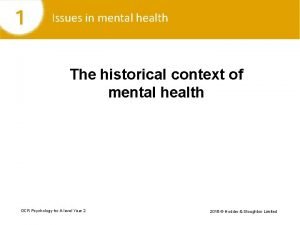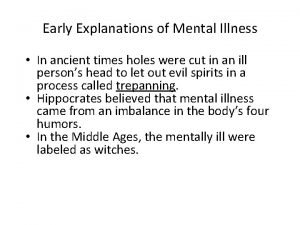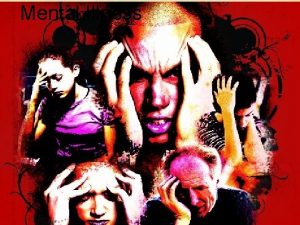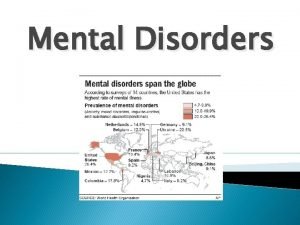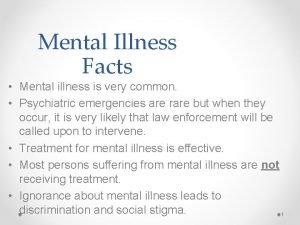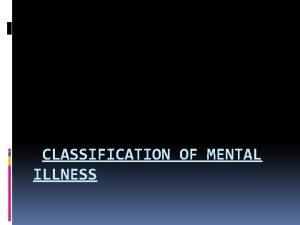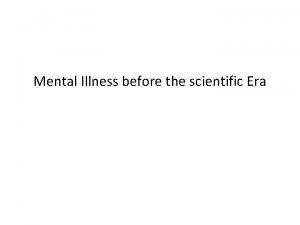Media representations of mental illness policy implications in
















- Slides: 16

Media representations of mental illness & policy implications in Greece Marina BASTOUNIS, University of Paris 5, Institute of Psychology Michail MAVROMMATIS, University of Essex, Dept. of Sociology ROMA 2006

Aim and Objectives of the Study n n Aim: To examine televised representations of madness in relation to mental health policy in Greece. Objectives: a. To discuss current lay ideas about madness. b. To show madness and the mad are portrayed on television. c. To assess the role of these portrayals on the shaping of lay ideas about madness. d. To present current mental health policy in Greece. e. To investigate the role of lay ideas on the course of mental health policy. 3/5/2021 ROMA 2006 2

Previous Studies n Bibliography on televised representations of madness in Greece is very limited. 3/5/2021 ROMA 2006 3

Psychiatry in Greece n n n 1862: Initiation of Institutional Psychiatry in Greece. 1957: Introduction of the ‘Leros Colony of Psychopaths’. 1984: The 5 -year plan for the reform of Greece’s psychiatric services. The Mental Health reform. 3/5/2021 ROMA 2006 4

Economou & Stephanis (2001) Source of information about schizophrenia in the past 6 months (%): 3/5/2021 Television 66 Newspapers 6. 6 Conversations with friends and family 6 Magazines/Periodicals 4. 3 Radio 3. 7 Books 2. 7 Other sources 3 Do not remember 17. 4 ROMA 2006 5

The Greek Movie Industry (1950 -60) n n n Constantly re-run in prime time Drama: Madness related to the female mental breakdown Comedy: the happy madman & the bizarre psychiatrist. Rarely is the madman related to violence or crime. Social instrumentalisation of madness: one can be driven mad by relatives. 3/5/2021 ROMA 2006 6

Study 1: Quantitative Analysis of Greek Television Fiction: 1990 to 1995 n n n Based on TV-guide summaries 47 characters appearing in 45 prime time series Madness related to q q n Familiarising q q n male characters in comedy & female characters in drama “psychological problems” of both genders & the intervention of psychiatry in their resolution. Excluding any realistic discussion of psychosis 3/5/2021 ROMA 2006 7

Gender Genre Mental Illness M F Com Dram Hospitalisation Psychiatric consultation Madness 7 - 6 1 - 1 Criminal madness 3 1 - 4 - - Fragile nerves - 11 1 10 5 7 Psychological problems 4 5 1 4 Nervous breakdown - 3 2 1 Schizophrenia - 1 1 1 Multiple personality 1 - - - Amnesia - 2 1 1 - - Obsessive thoughts - 3 2 1 - 1 Hallucinations 1 - - The village fool 3 - 1 2 - - Mental retardation 1 1 - 2 1 1 Not precise 2 - 1 1 1 - Totals 22 27 17 32 11 26 3/5/2021 ROMA 2006 8

STUDY 1 Quantitative Analysis of Greek Television Fiction: 1990 to 1995 n In clinical terms: q q 3/5/2021 Neurotic type of disorders are dealt with frequently as not stigmatising, similarly with psychiatric treatment & psychotherapy. Psychosis is represented as mysterious & dangerous, in a smaller number of productions ROMA 2006 9

Content Analysis of Television Fiction 1995 -2000 n Focused again on the plot of fictional productions aired in prime time 3/5/2021 ROMA 2006 10

STUDY 2: Television Fiction 1995 -2000 n Stereotypical beliefs such as that the mad are dangerous, threatening, criminal, and deserve to be placed in the margins of society. 3/5/2021 ROMA 2006 11

I Lampsi and Kalimera Zoi n The two series whose episodes are mostly used in this study. 3/5/2021 ROMA 2006 12

Have you seen or heard at the news or read in the newspapers anything relevant to schizophrenics? If yes, how was their profile described? 3/5/2021 Violent or dangerous to others 33. 80% Suffer from symptoms like hearing voices or talking to themselves 18. 00% Commit a crime 17. 10% Other negative descriptions 7. 60% Their appearance is slovenly/dirty 5. 90% Other positive descriptions 4. 50% Cause public annoyance 4. 00% Suffer from a serious disorder 3. 60% Suicidal 2. 80% Need better treatment/support 2. 30% Victims of a criminal action 0. 30% Are homeless 0. 20% Do not remember 27% ROMA 2006 13

Which, in your opinion, is the best treatment for schizophrenia? Combination of drugs and psychotherapy 78. 5 Drugs prescribed by a doctor 8. 5 Psychotherapy 6. 6 Neither, it is incurable 2. 1 Other 0. 6 Do not know 3. 7 3/5/2021 ROMA 2006 14

What are the reasons for opposing the introduction of local guesthouses for people with schizophrenia? Dangerousness of patients (I’d be afraid to go out) 43. 2 Disturbance (images, screams would disturb) 25. 5 ‘It would be a problem’ 11. 4 Psychological impact 8. 3 Devaluation of the area 2. 7 Unsuitable area 2. 4 Do not know 6. 6 3/5/2021 ROMA 2006 15

Conclusion n n Representations of ‘madness’ in Greek television empower the widespread fear of contact with the patients In combination with the absence of the Greek state in the realisation of the mental health policy, the shift to community care is hindered. 3/5/2021 ROMA 2006 16
 Mental health and mental illness chapter 20
Mental health and mental illness chapter 20 Mental health coping skills jeopardy
Mental health coping skills jeopardy Historical views of mental illness psychology ocr
Historical views of mental illness psychology ocr Fair housing act mental illness
Fair housing act mental illness Mental illness in ancient times
Mental illness in ancient times Axis 1 and axis 2 disorders
Axis 1 and axis 2 disorders Mark rothko mental illness
Mark rothko mental illness Catherine earnshaw mental illness
Catherine earnshaw mental illness Americanization of mental illness
Americanization of mental illness Classification of mental illness
Classification of mental illness Ksi depression
Ksi depression Unit 1: media representations mark scheme
Unit 1: media representations mark scheme How audience negotiate meaning in mil
How audience negotiate meaning in mil Legal implications of social media
Legal implications of social media Mental health policy, plans and programmes michelle funk
Mental health policy, plans and programmes michelle funk On single image scale-up using sparse-representations
On single image scale-up using sparse-representations Pompeii logo
Pompeii logo


